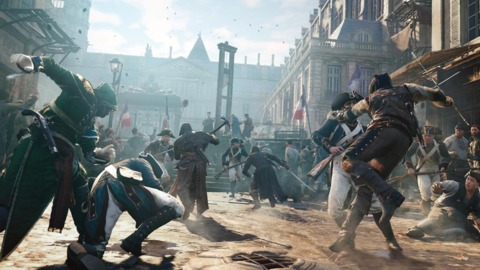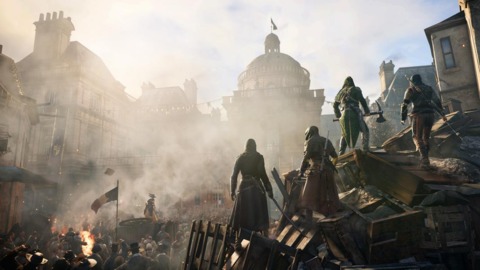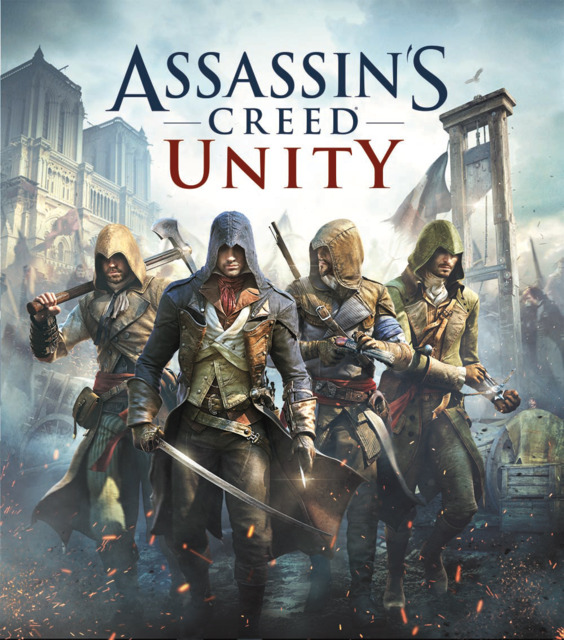With a lack of reinvention in its aging mechanics and tired mission design, Unity has more problems than a few bugs
I’ve had a scattershot relationship with Assassin’s Creed: Unity. I played through its first half during the initial week of its release before opting to put it down and take a self-appointed break. That lasted for roughly three weeks until I went back and finished it just a few days ago. Now, some of you may be wondering why the gap in-between, but if you know anything about Ubisoft’s latest neck-stabbing opus you can probably hazard a rather accurate guess as to why I felt the need to stop playing half way through. Here was a game where glitches of varying severity hid in almost every nook and cranny; where no play session was safe from something going terribly wrong. In ways in which I can’t recall seeing from a big, triple-A release,Unity was a technical debacle of surprising profligacy. Waiting for a patch or two seemed like a good idea.

During that first week I came across plenty of issues, it honestly boggled the mind how Unity was let out of the oven when it clearly wasn’t ready. From falling through the world on multiple occasions, to encountering hard lock-ups, becoming stuck in walls and haystacks, witnessing all number of hilarious NPC mishaps and repeatedly cursing to the heavens at its awful and rapidly fluctuating framerate. Many other players encountered similarly troubling afflictions with the internet soon awash with footage of character models gone horribly wrong, NPCs interrupting cutscenes, bodies contorting inside themselves and almost anything else you can imagine going wrong with a videogame. Unity was an indefensible mess.
Now, a few weeks and four patches later, things are looking slightly better – almost, but not quite, justifying my decision to take a break and wait for these fixes. It’s still not what one might call a polishedproduct; my first time playing post-patch I had a mission to steal a “scathing review” – of all things – only for the NPC carrying it to become stuck in a wall, forcing a restart. I also fell through the world on two occasions despite the second patch noting this as a particular fix, and encountered a few other technical annoyances as well. On a positive note, the previously dreadful framerate is markedly smoother after the most recent patch, though it does still struggle in certain areas. And this has introduced more complications elsewhere with some egregious NPC pop-in. This was an issue beforehand but now its only exacerbated with Parisians often popping into thin air mere inches away from you.
That Ubisoft are giving away Unity’s first piece of DLC for free as an apology for these woes is a welcome gesture, but one borne out of necessity. No game should be released in this kind of condition, even if things have gotten marginally better since its troubled launch.
It’s a shame, too, because Unity’s realisation of 18th century Paris is absolutely stunning. After a few years braving the American wilderness and sailing the high seas of the Caribbean, Unity sees a return to the series’ roots, presenting a sprawling European city for you to parkour your way up, over and around. This vision of Paris amidst the historic upheaval of the French Revolution is enormous in scope and rife with violent civil unrest. The skyline stretches for as far as the eye can see in every direction, punctuated by the beautiful architecture of Notre Dame, Sainte-Chapelle and La Bastille. Each street is bustling with life, from angry mobs to merchants selling their wares, while the stark contrast of the rich and poor is clear for all to see with the luxurious mansions of La Marais and the ramshackle shops and desperate beggars of Ventre de Paris. There are even modelled interiors, swathed in gold and pristinely kept, or full of rapturously singing Parisians as a bard livens up a local pub with merry song. That Unity is the first in the series to be developed exclusively for the new generation of consoles should come as little surprise: this is the best Assassin’s Creed has ever looked.
I only wish it did more with its setting. While revolution is rampant on the city streets, the story is happy to sit on the periphery of the significant events happening all around you. Paris and its uprising citizens should be a character all their own, but Ubisoft could have set Unity anywhere else in the world and told the exact same tale of revenge (which is becoming a Ubisoft trademark), conspiracy and fleeting romance. You’ll meet a few historical figures on your adventures, like the lascivious Marquis de Sade and a young, determined Napoleon Bonaparte, but just as soon as you’ve met them have they vanished from proceedings altogether. After Assassin’s Creed IV: Black Flag used its historical characters so memorably, it’s incredibly disappointing to see Unity’s disinterest in anything but a cursory glance thrown their way.

Instead, the narrative is keen to hook your interest with this confusing murder mystery. As Arno Dorian, your goals are driven by a personal vendetta against those responsible for the deaths of people close to you. He’s a self-interested assassin so his vengeance has very little to do with the creed he’s sworn allegiance to. This type of narrative can work well (case in point: Black Flag) but Arno just isn’t all that interesting, so putting the story on his back is likely to strain it. He’s likeable, sure, but even his early roguishness turns drab once he becomes an assassin and the story adopts an all too self-serious tone.
It’s an underdeveloped tale, too. The conspiracy at its heart is often unintelligible and horrendously plotted, with the targets you’re sent to assassinate given no room to develop. I never really cared why I was doing whatever I was doing because none of it is contextualised in a way to make you give a damn. Even the once-lauded post-kill confessionals have been replaced by scattered memories that are meant to help Arno solve this mystery, bereft of any character. Each assassination is just a way to move you up the conspiratorial ladder; you’re unlikely to remember half the people on it when all is said and done.
Even the sci-fi meta story is as inconspicuous as it ever has been, so much so that when it does rear its head it ends up feeling intrusive, further relegating anything post-Desmond to the back of everyone’s mind. Its only meaningful impact emerges in the shape of time anomalies that are basically just an excuse to let you climb the Eiffel Tower. As far as diversions go this is one of the more interesting ones – I certainly didn’t expect to be shooting Luftwaffe out of the sky when I booted the game up – but it’s still just another traversal mission you’ve already played a million times before.
This feeling of familiarity is one that permeates throughout the rest of Unity. The core of the series is the same here as it always has been. You’ll still leap across rooftops, blend into crowds, stab people with hidden blades and engage enemies head-on with counter-based melee combat. Eavesdropping missions are mercifully few and far between, and key assassinations take on a more elaborate role as you’re given various ways to take out your target, but that keen sense of over-familiarity is always present.
After seven years of playing the same kind of experience you know what to expect by now and it’s a formula that’s showing its age. You only need to look at something like Shadow of Mordor to see how other studios have made strides within the genre. Here’s an open-world game that changed our preconceptions for what the genre can be, while also improving upon the systems Assassin’s Creed once formulised. Traversal in Mordor is fast-paced and fluid; the predatory stealth comes naturally and everything about it is so inherently satisfying in its ease of use. Unity ends up feeling archaic by comparison, like an old relic afraid to reinvent itself.
New animations certainly spruce up the freerunning after all these years, and Paris is so intricately designed that bounding from building to building is as fun and gorgeous to look at as it will ever be, but Unity is still plagued by the same problems the series has had since day one. Arno will still stick to surfaces you didn’t want him to stick to, leap in a direction you hadn’t intended and struggle to get through windows like he’s trying to park a caravan for the very first time. The rather belated addition of dedicated stealth only adds to these issues with a clunky cover system that rarely works as one might hope.

More is more seems to be the Unity ethos, foregoing anything new or fresh in favour of populating the streets of Paris with as many nebulous activities as possible. Looking at the map is an overwhelming ordeal, I’m particularly grateful to Ubisoft for providing a handy filter or else finding the next story mission amidst this cacophony of markers would be quite the task. If you’re a fan of abundant busy work then there’s plenty here to sink your teeth into. There are even chests to be opened away from the controller, like gold ones that can only be opened dependent upon your level on something called Initiates, a website that tracks how many games you own in the Assassin’s Creed series and how much you’ve played of them. Or blue chests that can only be opened by playing the companion app for phones and tablets. I’m sure that’s fun.
At some point early on I knew what every map marker stood for and made it a point to avoid anything requiring engagement with distractions on the periphery of the game I actually bought to play.
Elsewhere, character customisation is enjoyable, lending a sense of ownership and tangible progression to your own personalised Arno, but Ubisoft’s overbearing business practises are felt here, too. By spending real-world money you can purchase Helix Points, a premium currency that lets you buy weapons, clothing and temporary boosts without needing to earn in-game cash. They’re called microtransactions but there’s nothing particularly micro about a £79.99 purchase atop the full-priced game you’ve already paid for. It’s gross and shameless, especially since buying these items is essential to progressing through the game. Of course, you can still grind the in-game cash and buy them that way – as I did – but this feels like a system designed around encouraging people to part with more cash than they already have. Ubisoft aren’t the first to do this and they probably won’t be the last, but that doesn’t make it any less off-putting.
Fortunately, one of the easy ways to earn in-game cash is by playing Unity’s new co-operative multiplayer. As the one major addition on show, it’s actually rather successful, letting up to four colourful Arno’s run around Paris together with specific co-op missions designed for either two or four players. Each mission is its own little vignette, telling a self-contained story within the time period and allowing you and a few friends or strangers to perform various assassinations, stealthy infiltrations and escort jobs. It can get a little chaotic with strangers since everyone invariably ends up doing their own thing, but if you can get a few friends together the co-op is undoubtedly the best thing Unity has going for it.
I suppose it shouldn’t be too surprising that Unity’s one major addition ends up feeling fresh and exciting. While its myriad of technical issues are certainly detrimental to anyone’s enjoyment, it’s the lack of ambition in reinventing its aging mechanics and tired mission design that leave Unitytreading water. Black Flag showed that with a few key design changes this is a series that can still flourish and create fantastic experiences, often in spite of its core mechanics, but Unity’s reliance on them makes it feels like a step back when it should have taken a giant leap forward. The endless possibilities afforded by the series’ time travelling concept will continue to offer hope that Assassin’s Creed can still shine, but it needs to take a long, hard look at itself before that can happen. More of the same just doesn’t cut it anymore.
